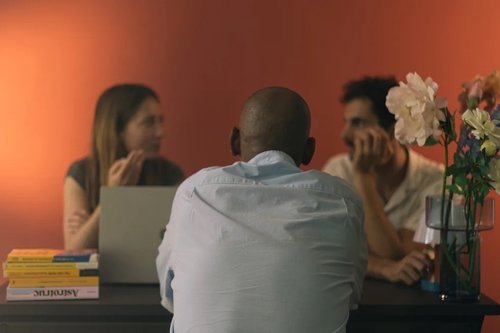The rhythm of the interview: expert tips for speaking on the big day
Sep 26, 2022
4 mins


Journaliste indépendante.
They say that a successful job interview follows the 80/20 rule: the candidate speaks for 80% of the time, and the recruiter speaks for the remaining 20%. The recruiter’s role is to ask the right questions and supply key details about the role. The candidate is there to talk about their experiences and prove that they’re the best person for the job, using relevant and carefully worded answers. Well, that’s the theory …
In reality, things aren’t that simple. Managing your speaking time in an interview is no small feat: chances are, a little voice in your head is second-guessing your every sentence. “Take your time! No, hurry up. Now slow down! Time is running out: go, go, go!” How can you know if you’re speaking too much or not enough? Margaux Lefebvre, public speaking expert, is here to guide you through some classic interview situations, pointing out pitfalls to avoid and giving you the tools that you need to shine.
The monologue: to be, or not to be?
You’ve launched into a run-on speech that would make even a seasoned Shakespearean actor flinch. Words are practically falling out of your mouth, with ideas flying around left and right. By the time you’ve realized what’s happening, it’s already too late. Or is it?
“Not necessarily,” says Lefebvre. It’s best to avoid the extremes—talking so much that the interviewer can’t get a word in, or remaining practically mute throughout the whole interview—but how a listener “feels” time depends on how you make them feel. “I like to use movies as an example,” she says. “Several hours might go by in a flash in front of something like Lord of the Rings, but a thirty-minute short film might seem to drag on for eternity.” So, if you think that the ins and outs of your latest project are interesting enough to merit a full breakdown, then work out what you’re going to say ahead of time: that way, you can keep your listener hooked and draw their attention to the most important points.
You’re more likely to drone on if you feel like you’ve been put on the spot, perhaps in reaction to an unexpected question. You’ll start to explain yourself, then back up, go off at a tangent, keep adding ideas here and there, and before you know it, you’re rambling incoherently. “That’s why preparation is so important,” states Lefebvre. “You need to have one or two key messages you want to get across in your answers to any type of question. And if you get asked a question you weren’t expecting, take a few seconds to think about your response before you open your mouth.”
But what if you have a lot to say? The key is to remember that an interview is meant to be a conversation. Ask the interviewer how long they want to spend on a question: “I have several relevant experiences in this area. How many would you like me to tell you about?” Alternatively, you could give a quick overview of what you have to say, then ask the interviewer if they’d like to hear more: “Those are the main aspects, should I go on?”
Bridging awkward gaps in conversation
Talking too much can be a problem—but then, so can talking too little. Uncomfortable silences can be unnerving during an interview, especially if you don’t know whether it’s up to you or the interviewer to get things going again.
If your answer to a question is met with silence, perhaps the interviewer just needs a few moments to absorb what you’ve said, or maybe they’re thinking about their next question. If things are getting uncomfortable and the recruiter seems receptive, Lefebvre suggests asking a question (“Do you want me to go on?”) or even using humor to break the silence. “Acknowledging the silence can create a feeling of complicity between you and the recruiter, strengthening the human connection. Humor can disperse tension and lighten the tone of the discussion,” she explains.
What if you can’t answer a question? Lefebvre’s answer is simple: don’t panic! An honest and open response is a token of maturity and candor. “Humor and sincerity are the best tools for building empathy. Whatever happens, admitting that you don’t have all the answers is rarely a bad move.”
The power of silence
Yes, silence can be stressful, but it can also be a valuable tool. That’s why you don’t need to jump in with an immediate answer to every question. Lefebvre suggests taking two to three seconds before responding, something she calls “smart silence”. This short break allows the interviewer to re-focus their attention on what you’re about to say and shows you’ve thought about your answer.
You’ve heard the term “ethos” before, but did you know that the original Latin meaning relates to the impression made on others by a speaker? The greatest speakers know how to use silence to their own ends, to mark a point or create a compelling atmosphere: “Silence is a key element of the ethos. It creates an impression of mastery. It makes you the master of your time,” says Lefebvre.
Silence also gives you time to think. A few precious seconds can be enough to develop a constructed, reasoned response to a question—and that’s far better than giving an immediate but irrelevant answer.
Paraverbal communication in interviews
Paraverbal communication is everything that relates to speech besides the actual words you use: your tone of voice, volume, speed, and so on. Do you tend to talk fast? Stress often causes people to speak even faster, so you’ll want to slow down. Lefebvre recommends practicing reading aloud to help slow yourself down and suggests candidates focus on their breathing.
Another point to think about is how you finish your sentences. Do you tend to trail off? Do you feel the need to say “that’s all” at the end of every answer? If you’re aware of any verbal tics you might have, you can do something about them: finishing your sentences neatly gives the impression of confidence. When you speak, your sentences will naturally “wind down”: at the end of a phrase, your speech slows, and the pitch of your voice gradually descends. The listener will know you’ve finished without you needing to tell them. “Don’t be afraid to leave a moment of silence at the end of your answer,” adds Lefebvre. “Silence is a clear sign that you’ve finished speaking, and the interviewer will pick up on that.” If the silence is getting uncomfortable, then you can always ask a question, as we said earlier. Aaaaand … that’s all.
Translated by Catherine Prady
Photo: Welcome to the Jungle
Follow Welcome to the Jungle on Facebook, LinkedIn, and Instagram, and subscribe to our newsletter to get our latest articles every day!

More inspiration: Ace your job interview

Why are you leaving your job? Here's how to nail the answer
Caught off guard by 'Why are you leaving your job?' Here's how to flip this tricky question into a spotlight on your goals and potential.
Dec 24, 2024

Standing out in an interview: Creative responses to common questions
Answering common interviews with common responses isn't going to get you far in today's job market. Here's how to truly stand out!
Nov 26, 2024

The Pratfall Effect: Can screwing up in a job interview make you more likable?
Mistakes you make in a job interview could actually work to your advantage ...
Oct 14, 2024

How to bring up your long-term career goals in an interview
Be honest but strategic. The key is aligning your goals with the role while showing flexibility and ambition. Avoid faking it!
Sep 24, 2024

Is honesty the key to discussing your weaknesses?
Are your weaknesses holding you back in an interview? A bit of honesty can flip the script and make your flaws work in your favor.
Aug 21, 2024
The newsletter that does the job
Want to keep up with the latest articles? Twice a week you can receive stories, jobs, and tips in your inbox.

Looking for your next job?
Over 200,000 people have found a job with Welcome to the Jungle.
Explore jobs